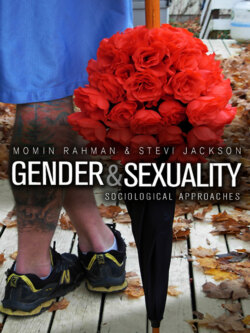Читать книгу Gender and Sexuality - Stevi Jackson - Страница 13
На сайте Литреса книга снята с продажи.
Introduction: The Unfortunate President
ОглавлениеLawrence H. Summers resigned yesterday as president of Harvard University after a relatively brief and turbulent tenure of five years, nudged by Harvard’s governing corporation and facing a vote of no confidence from the influential Faculty of Arts and Sciences.
(The New York Times, 22 February 2006, Section A: 1)
In early 2005, President Summers delivered a conference speech in which he raised the question of whether inherent genetic or other biological traits were the reason that so few women made it to the top of the maths and science professions. The ensuing public arguments between Summers and his academic faculty made news across the world but particularly in the USA, where Harvard is the most verdant of the Ivy League universities, which make up the oldest and richest institutions in the American higher education system. It is instructive to consider this incident as a micro- example of the impact on contemporary societies of sociological thinking on gender and sexuality. That is not to say that the Harvard President eventually resigned only because of his stance on gender, since further reports during 2005 demonstrated that there were many aspects of his management style that were causing unrest amongst the staff. However, the remarks on gender did signal the beginning of making these issues public and, therefore, illustrate the importance of gender politics in contemporary culture. Summers made news precisely because he raised questions about the status of women and in particular their biological difference from men. In the early twenty- first century, such a position is newsworthy because it is controversial. Why is this the case?
In part the answer is because we live in societies in the West in which equality between the sexes is now a taken- for- granted aspect of how we should conduct our public life. We have social policies and laws that both protect individuals from discrimination and grant access to resources in terms of citizenship, rights and democracy. Women can now enter the same educational and employment sectors as men, and discrimination on the basis of sex – and increasingly on the basis of sexual identity – is regarded as unacceptable. We had a woman running for the Democratic Party’s nomination for Presidency of the United States in 2008 and for most of the primary season Hillary Clinton was the frontrunner. We already have women in positions of political and public office around the world [1], as well as significant advances in lesbian and gay rights such as partnership, marriage, parenting and anti- discrimination rights. Popular culture has reflected a shift in understandings of women’s status, and that of lesbians and gays, with successful television programmes such as Sex and the City, Will and Grace, Queer Eye for the Straight Guy, numerous films which attest to women’s independence and, of course, successful women in both sport and entertainment (see Introduction to Part III). Indeed, if anything, the last few years has seen increasing concern about the problems of boys and men, often referred to as the crisis of masculinity in a post- feminist world [2].
Over the last thirty years or so, sociological analyses of gender have had a significant impact upon our political and popular culture, resulting in a shift in the understanding of the reasons for the differences and inequalities between men and women. Indeed, this point was made by many of the Harvard faculty who signed a letter of protest at their President’s comments, drawing attention to the extensive academic research establishing that the status of women is social rather than biological or natural. We begin an introduction to these analyses in the following chapters, concentrating on the ways in which essentialist or naturalist explanations of gender inequalities and related issues of sexual behaviour and identity have been challenged. It is this particular issue of naturalism that the unfortunate Harvard President fell foul of (although his subsequent career did not suffer given that he went on to become a senior economic adviser to President Obama). While he actually discussed a range of reasons for women’s limited progress within maths and science, including the lack of proper childcare facilities and the role of discrimination, he also invoked the notion of a biological basis to women’s lack of ambition and success, provoking a substantial number of his faculty to criticize him on the grounds that he was ignorant of – or had wilfully ignored – decades of research on the social reasons for gender inequalities [3].
The chapters in Part I cover the main points of these sociological analyses, providing both a chronological introduction and a conceptual one. We thus demonstrate how gender and sexuality emerged as topics of sociological investigation and the historical importance of feminist/lesbian/gay movements in this development. We explain and illustrate the meaning of essentialism throughout and show how this naturalist explanation of differences has been subject to sociological critiques. Our focus is mainly on Anglo- American societies, and this is driven by the historical emergence of women’s and sexual diversity movements, together with academic work, from within these societies. However, it is important to remember that gender and sexual inequalities are global phenomena, and are also structured by racial divisions both globally and within specific societies. We point out, however, that the significance of racial, ethnic and national differences for gender and sexuality has often been neglected and begin to explain how and why. Taken together with the overall Introduction to the book, Part I provides a basic- level introduction to the sociology of gender and sexuality.
